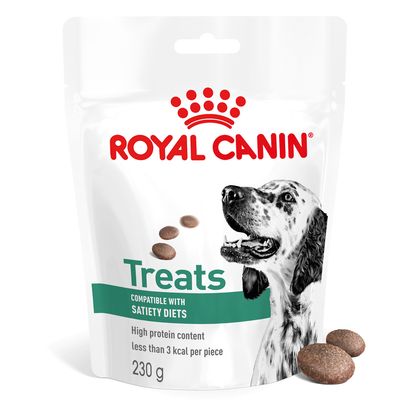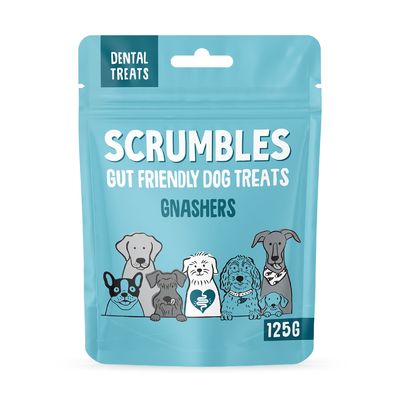Dog Treats
Greenies Dental Treats - Teenie (2 - 7kg)
Saver Pack: 2 x 340g
Delivery in 1-2 working days
Whimzees by Wellness Monthly Toothbrush Box
Size L: for large dogs (1.8kg, 30 Snacks)
Delivery in 1-2 working days
Whimzees by Wellness Monthly Toothbrush Box
Size M: for medium dogs (900g, 30 Snacks)
Delivery in 1-2 working days
Yarrah Organic Vegan Small Biscuits
250g
Delivery in 1-2 working days
Greenies Dental Treats - Teenie (2 - 7kg)
340g
Delivery in 1-2 working days
Dokas Chew Twisters
Saver Pack: Beef Hide, Tripe & Chicken Breast (2 x 200g)
Delivery in 1-2 working days
Barkoo Dental Snacks Grain-Free Saver Pack
Mini Dogs (112 Chews – 1.28kg)
Delivery in 1-2 working days
beaphar Flexifit® Advanced Joint Supplement Paste for Cats & Dogs
250ml
Delivery in 1-2 working days
Trixie Filled Chew Rolls with Tripe
45g
Delivery in 1-2 working days
Misfits Nasher Sticks with Chicken & Beef Dog Treats
for Large Dogs (270g)
Delivery in 1-2 working days
Royal Canin Puppy Immunity & Digestion Supplement Chews
100g (40 pieces)
Delivery in 1-2 working days
Royal Canin Satiety Treats
Saver Pack: 2 x 230g (300 pieces)
Delivery in 1-2 working days
Rocco Curls Saver Pack
Super Saver Pack: Duck (12 x 200g)
Delivery in 1-2 working days
Dokas Chew Twisters
Saver Pack: Beef Hide, Tripe & Chicken Breast (4 x 200g)
Delivery in 1-2 working days
Wolf of Wilderness Mini RAW Freeze-dried Snacks
Chicken Breast Fillet (60g)
Delivery in 1-2 working days
Whimzees by Wellness Monthly Toothbrush Box
Saver Pack: 2 x Size S
Delivery in 1-2 working days
ProDen PlaqueOff Dental Bites
60g
Delivery in 1-2 working days
Whimzees by Wellness Monthly Toothbrush Box
Saver Pack: 2 x Size M
Delivery in 1-2 working days
Natures Menu Country Hunter Superfood Bars with Duck
Saver Pack: 2 x 70g
Delivery in 1-2 working days
Whimzees by Wellness Toothbrush
Saver Pack: 2 x Size XS
Delivery in 1-2 working days
alpha spirit Sticks Mixbox All 6 Tastes
24 sticks
Delivery in 1-2 working days
Scrumbles Dental Gnashers
7 Sticks (125g)
Delivery in 1-2 working days
Royal Canin Urinary Treats
Saver Pack: 2 x 230g (300 pieces)
Delivery in 1-2 working days
Pet Munchies Sticks
Salmon & Sweet Potato (90g)
Delivery in 1-2 working days
What types of dog treats are there, and what’s in them?
When choosing a treat, ingredients matter. Here are the most common treat types and what to consider:
- Chew strips: Typically semi-moist and often made with a poultry or beef base. They may include vegetable-derived ingredients for variety.
- Chew sticks: Firmer and longer-lasting, typically made with dried meat or natural fibres. Always check for a declared protein source to match your dog’s dietary preferences or sensitivities.
- Dog bones: Available air-dried or smoked. Match the bone size to your dog’s chewing style, and supervise use.
- Dog biscuits: Offered in low-fat, vegetarian, or single-protein varieties. Look for options without artificial colours, flavours, or added sugar.
- Functional treats: Formulated for specific feeding preferences.
We’ve put together some special dog treats offers and trial packs to help you explore what works best for your dog.
Remember: Check labels carefully and consult your vet for special dietary requirements.
What types of dog treats are there, and what’s in them?
When choosing a treat, ingredients matter. Here are the most common treat types and what to consider:
- Chew strips: Typically semi-moist and often made with a poultry or beef base. They may include vegetable-derived ingredients for variety.
- Chew sticks: Firmer and longer-lasting, typically made with dried meat or natural fibres. Always check for a declared protein source to match your dog’s dietary preferences or sensitivities.
- Dog bones: Available air-dried or smoked. Match the bone size to your dog’s chewing style, and supervise use.
- Dog biscuits: Offered in low-fat, vegetarian, or single-protein varieties. Look for options without artificial colours, flavours, or added sugar.
- Functional treats: Formulated for specific feeding preferences.
We’ve put together some special dog treats offers and trial packs to help you explore what works best for your dog.
Remember: Check labels carefully and consult your vet for special dietary requirements.
How do I choose the perfect dog treat?
Not every treat suits every dog. Age, dietary needs, and treating reason play a role in making the best choice. Here’s a guide to help you choose:
| Factor | Age |
|---|---|
| What to keep in mind | Choose age-appropriate treats, like senior dog treats or puppy treats. |
| Factor | Dietary requirements |
| What to keep in mind | If your dog has sensitive digestion or food intolerances, especially to grains or common proteins like chicken, consider low-fat dog treats, grain-free dog treats, limited-ingredient treats, or specially formulated sensitive treats for dogs. |
| Factor | Purpose |
| What to keep in mind | Treats can be used for training, teething, or simply adding variety to your dog’s routine. Some include ingredients selected by pet owners for specific feeding preferences, such as supporting oral hygiene, maintaining coat condition, or aiding mobility. Always consult your vet before introducing treats for specific needs. |
Factor | What to keep in mind |
|---|---|
Age | Choose age-appropriate treats, like senior dog treats or puppy treats. |
Dietary requirements | If your dog has sensitive digestion or food intolerances, especially to grains or common proteins like chicken, consider low-fat dog treats, grain-free dog treats, limited-ingredient treats, or specially formulated sensitive treats for dogs. |
Purpose | Treats can be used for training, teething, or simply adding variety to your dog’s routine. Some include ingredients selected by pet owners for specific feeding preferences, such as supporting oral hygiene, maintaining coat condition, or aiding mobility. Always consult your vet before introducing treats for specific needs. |
Don’t forget: Dental toys like olive wood chew sticks are free from artificial ingredients, designed to be long-lasting, and may help satisfy your dog’s natural chewing behavior.
Tip: Treat bags and pouches make it easier to reward consistently during training.
How do I choose the perfect dog treat?
Not every treat suits every dog. Age, dietary needs, and treating reason play a role in making the best choice. Here’s a guide to help you choose:
| Factor | Age |
|---|---|
| What to keep in mind | Choose age-appropriate treats, like senior dog treats or puppy treats. |
| Factor | Dietary requirements |
| What to keep in mind | If your dog has sensitive digestion or food intolerances, especially to grains or common proteins like chicken, consider low-fat dog treats, grain-free dog treats, limited-ingredient treats, or specially formulated sensitive treats for dogs. |
| Factor | Purpose |
| What to keep in mind | Treats can be used for training, teething, or simply adding variety to your dog’s routine. Some include ingredients selected by pet owners for specific feeding preferences, such as supporting oral hygiene, maintaining coat condition, or aiding mobility. Always consult your vet before introducing treats for specific needs. |
Factor | What to keep in mind |
|---|---|
Age | Choose age-appropriate treats, like senior dog treats or puppy treats. |
Dietary requirements | If your dog has sensitive digestion or food intolerances, especially to grains or common proteins like chicken, consider low-fat dog treats, grain-free dog treats, limited-ingredient treats, or specially formulated sensitive treats for dogs. |
Purpose | Treats can be used for training, teething, or simply adding variety to your dog’s routine. Some include ingredients selected by pet owners for specific feeding preferences, such as supporting oral hygiene, maintaining coat condition, or aiding mobility. Always consult your vet before introducing treats for specific needs. |
Don’t forget: Dental toys like olive wood chew sticks are free from artificial ingredients, designed to be long-lasting, and may help satisfy your dog’s natural chewing behavior.
Tip: Treat bags and pouches make it easier to reward consistently during training.
How do I choose the right size chew for my dog?
When choosing a chew, it’s important to consider your dog’s size, jaw strength, and chewing habits.
- Small dogs (under 10 kg) typically require smaller, softer chews.
- Medium dogs (10–25 kg) are best suited to medium-sized chews with moderate firmness.
- Large dogs (over 25 kg) usually need larger, more durable chews that can withstand vigorous chewing.
The chew should be large enough that it cannot be swallowed whole, and its texture should match your dog’s chewing style. Softer chews may be more appropriate for puppies or older dogs, while firmer options are better for enthusiastic chewers.
Always follow the manufacturer’s size guidelines, supervise your dog while they chew, and ensure fresh drinking water is available. Selecting the right size helps promote a safe and enjoyable chewing experience.
How do I choose the right size chew for my dog?
When choosing a chew, it’s important to consider your dog’s size, jaw strength, and chewing habits.
- Small dogs (under 10 kg) typically require smaller, softer chews.
- Medium dogs (10–25 kg) are best suited to medium-sized chews with moderate firmness.
- Large dogs (over 25 kg) usually need larger, more durable chews that can withstand vigorous chewing.
The chew should be large enough that it cannot be swallowed whole, and its texture should match your dog’s chewing style. Softer chews may be more appropriate for puppies or older dogs, while firmer options are better for enthusiastic chewers.
Always follow the manufacturer’s size guidelines, supervise your dog while they chew, and ensure fresh drinking water is available. Selecting the right size helps promote a safe and enjoyable chewing experience.
What is the difference between dog treats and chews?
Treats are typically small, quick-to-eat snacks used for training or rewards. Chews tend to last longer and are chosen based on texture and chewing behaviour.
What is the difference between dog treats and chews?
Treats are typically small, quick-to-eat snacks used for training or rewards. Chews tend to last longer and are chosen based on texture and chewing behaviour.
Why should I give my dog treats and chews?
Many owners use treats for training or bonding, while chews offer enrichment and engagement, especially for dogs who enjoy extended chewing.
Why should I give my dog treats and chews?
Many owners use treats for training or bonding, while chews offer enrichment and engagement, especially for dogs who enjoy extended chewing.
How often should I give my dog treats and chews?
Treats can be given daily in moderation. Frequency depends on the type and your dog’s individual needs. Always consult your vet for tailored advice.
How often should I give my dog treats and chews?
Treats can be given daily in moderation. Frequency depends on the type and your dog’s individual needs. Always consult your vet for tailored advice.






















